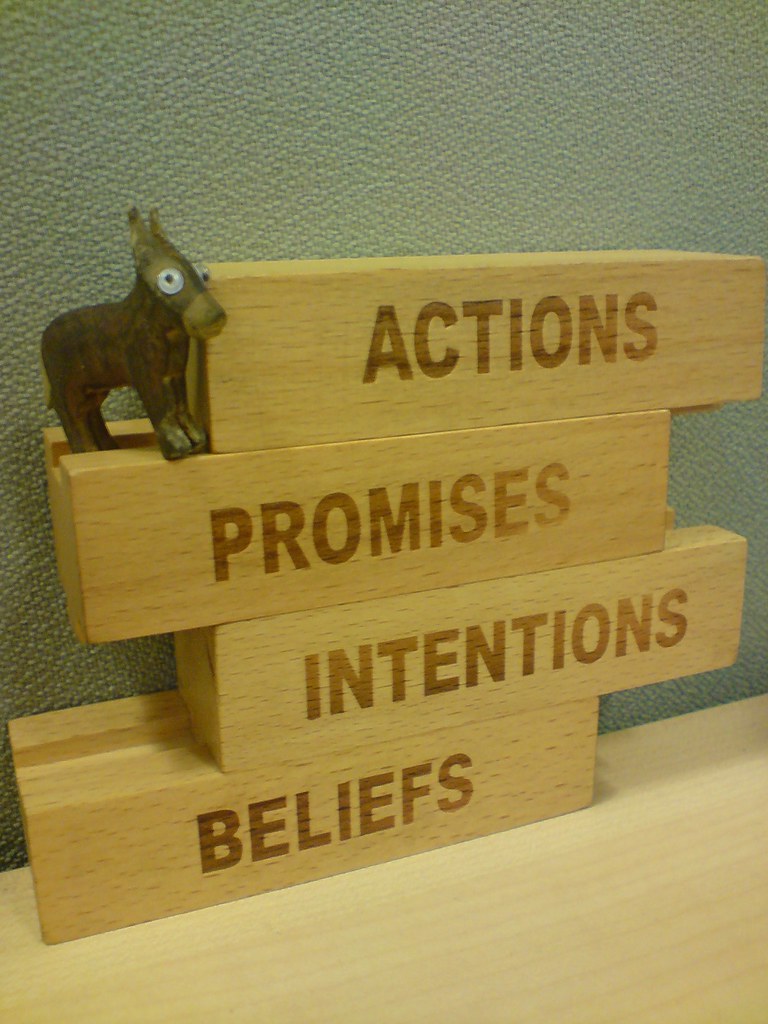Actions typically speak louder than words. A common version of this statement – practice what you preach – is a popular conversational quip, used by the religious and nonreligious alike to scoff hypocrites. In short, action codifies our cognitive sentiments – our beliefs. It is one thing to say you believe and quite another to act “as if” you believe. We typically take some actions (e.g. going to a church) to both entail, and lend credence to certain beliefs (e.g. believing in the Christian God), as opposed to others (e.g. not believing in a god, or believing in Allah). Nonetheless it is quite possible to attend church or participate in ritual without holding belief in a God or gods (c.f. Silver, Coleman, Hood & Holcombe, 2014). Importantly however, acting on our beliefs only lends CREDibility to them, and not veridicality. Conversely, failing to act on a professed belief has the potential to undermine the credibility of said belief (CRUDs): if it is important to attend church, but no one goes – is it really that important to attend? Moreover, if no one is going to church, maybe belief in God is not that important after all?
Much of the past research in the cognitive sciences of religion (CSR) has dealt primarily with how abstract symbols (minimally counterintuitive content (MCI); e.g. a talking mouse or invisible entities that can communicate with you) are processed by our mental architecture, and easily transmitted within populations due to their conceptual shape (for a critical review see, Purzycki & Willard, practices what they preach (both in and out of the religious domain), they may be seen as credible sources with which to acquire further information from (Henrich, 2009; Lanman, 2012). In this interview with Thomas Coleman, Dr. Jonathan Lanman highlights the role that public displays of commitment (CREDs & CRUDs) play in the acquisition of both belief and nonbelief.
Dr. Lanman begins by discussing his research interests and some of the current work underway at the Institute of Cognition and Culture. Next, he explains both content and context biases, and briefly outlines the notion of dual-inheritance theory. Importantly, Lanman goes on to emphasize how actions (CREDs), and failing to act (CRUDs), may contribute to the varying levels of religiosity seen throughout the world. In closing, Lanman suggests that while content biases are important for the transmission of religious concepts, they always occur in a given context: “upon initial evidence…[CREDs/CRUDs are] one of the most important factors in determining who ends up a theist and who ends up a nontheist.”
References
- Silver, C. F., Coleman, T. J. III, Hood, R. W. Jr., & Holcombe, J. M., (2014) The Six Types of Nonbelief: A qualitative and quantitative study of type and narrative. Mental Health, Religion & Culture. http://dx.doi.org/10.1080/13674676.2014.987743
- Henrich, J. (2009). The evolution of costly displays, cooperation and religion. Evolution And Human Behavior, 30(4), 244-260. doi:10.1016/j.evolhumbehav.2009.03.005
- Lanman, J. (2012). The Importance of Religious Displays for Belief Acquisition and Secularization. Journal Of Contemporary Religion, 27(1), 49-65. doi:10.1080/13537903.2012.642726
- Purzycki, B. G., & Willard, A. K. (in press). MCI Theory: A Critical Discussion [Target Article with Commentaries]. Religion, Brain and Behavior.






